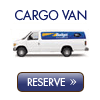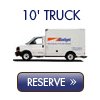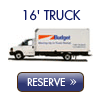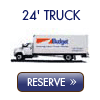Moving Truck
If you're thinking of moving yourself, whether it's across town or across the state or across the country, you'll need to rent a moving van, truck, or trailer, depending on how much stuff you have. Keep these points in mind when you start your research.
Where Are You Going?: If you're moving across town, most rental agencies will accommodate your needs; however, if you're moving across the state or across the country, you're more than likely planning a one-way trip. Most larger agencies will accommodate a one-way move, but ask up front. You may find that the extra cost they charge for this service isn't worth the hassle of moving yourself. Usually, the customer ends up paying for the company to return the truck to its place of origin. So, ask before you book.
Although very general, it will give you an idea of what you might need. For instance, a 26-foot truck will accommodate a 4-plus bedroom house, while a 10 foot mini mover is perfect for a small apartment. Most rental agencies will help you decide what size is right for you. Remember, it's always better to err on the side of caution and rent a larger truck, then potentially run out of space. Especially, if you're moving a long distance. Trying to switch truck sizes at the last minute will only cause delays or the inability to move all your things at once.
When Do You Need It?: Depending on the timing of your move, you may have to book a truck well in advance. Peak season starts around the end of May and runs until the end of September. If you're planning on moving during this period, call well in advance to reserve a vehicle. Remember that this will also affect pricing. Most agencies charge more during peak season. If you're having a hard time booking a truck, keep in mind that most people move at the beginning or end of a month. Mid-month moves usually are less popular, so if you're time is flexible, avoid month-ends and beginnings.
Are You Moving Any Additional Vehicles?: Will you be driving the car yourself or towing it behind the truck? Do you have any motorcycles or snowmobiles or boats? A trailer rental can increase your costs by an extra $150 to $300, depending on when you need it and if you need a trailer hitch and how many days you require it. Ask the company what costs are involved and what the best option is to move additional vehicles.
Insurance: Rental agencies will offer additional insurance which can cost up to $30.00 per day for every day the truck is on the road. Before you agree to the additional coverage, make sure you call your credit card companies. Most higher-end cards have built-in protection. Read the fine-print to make sure the insurance covers larger vehicles like moving vans and trailers and if you're towing your vehicle, if the coverage extends to any potential damage to your car. Will it protect you for collision? What is the deductible? Does the coverage extend to other states and countries? Does the coverage include property damage if your belongings are affected by an accident? What about theft? Not only ask these questions of your credit card company, but also of the rental agent and make sure you're fully protected.
What Else Do You Need?: Most rental agencies will also rend pads and dollies. You'll need protective padding so your valuable antiques or leather couch doesn't get scratched or ripped during the move. Pads usually rent for approximately $5.00 for six, if you're moving locally, or $10 for twelve, when moving one-way. Most companies will recommend 24-30 pads for a 3-4 bedroom house. Again, it's better to have too many, then too little. Pads also work well to slide heavier items across the truck bed and will ensure the metal floor doesn't scratch your valuables.
Dollies rent for between $7.00 and $12.00, depending on the size and where you're moving to. Dollies are an essential tool to make your move easier.
Fuel Costs: When you pick up your truck, the gas tank should be full. Remember that you must return the vehicle with a full tank. If you don't the company usually charges a higher than average price for a fill-up. This price includes the time it takes for an employee to fill the tank. Also, make sure you ask about the vehicle's gas consumption and work this into your moving costs. A fully-loaded 26-foot truck will average about 10 miles per gallon.
If you're moving 1000 miles at 10 miles per gallon, you'll consume 100 gallons of fuel. With the cost of fuel average around $2.00 per gallon, you'll be spending $200 for fuel. If you're adding on a hitch and towing an extra vehicle, ask the rental agent how much extra this might cost to move. Weight plays a large part in fuel consumption.
|
 |
Find the truck
that's right
for you! |

|

|

|

|
| Capacity |
1-2 rooms |
1-2 rooms |
3-4 rooms |
5-8 rooms |
| Cubic Feet |
309 |
380 |
800 |
1,380 |
| Gross Vehicle Weight (GVW) |
7,200 lbs. |
8,600 lbs. |
11,500 lbs. |
25,500 lbs. |
| Payload Weight |
2,200 lbs. |
3,100 lbs. |
3,400 lbs. |
12,000 lbs. |
| Clearance |
8 6" |
9 0" |
11 6" |
13 6" |
Interior (Length)
(Width)
(Height) |
11
5 0"
4 4" |
10
6 3"
6 0" |
15 7"
7 5"
6 5" |
24
7 5"
7 5" |
Rear Door (Height)
(Width) |
4 0"
4 6" |
5 5"
5 9" |
6 5"
7 3" |
7 0"
7 3" |
| Load Ramp Width |
NA |
NA |
2 3" |
2 4" |
| Load Ramps |
|
|
 |
 |
| Air Conditioning |
 |
 |
 |
 |
| Automatic Transmission |
 |
 |
 |
 |
| Power Steering |
 |
 |
 |
 |
| Power Brakes |
 |
 |
 |
 |
| AM/FM Stereo |
 |
 |
 |
 |
| No Wheel Wells |
|
 |
 |
 |
| Dual Faced Mirrors |
|
 |
 |
 |
| Tie Down Slats |
|
 |
 |
 |
| Seat Belts / Seats |
2 |
2 |
2 |
3 |
| Fuel Tank |
35 Gallon |
35 Gallon |
35 Gallon |
55 Gallon |
| Lift-gate |
|
|
Business use only |
Business use only |
|
|
|
|
|
|



